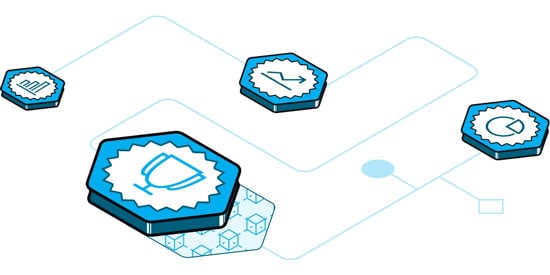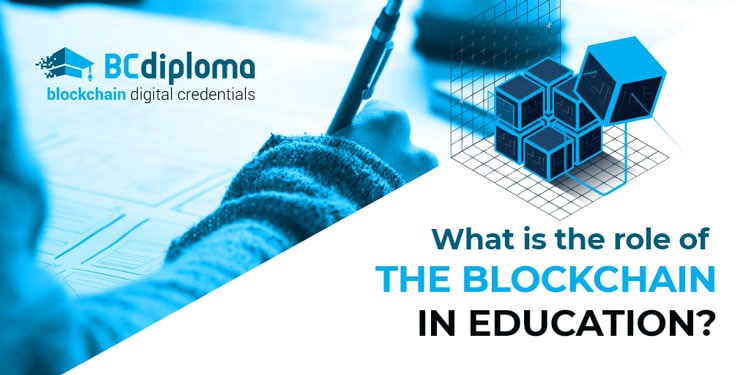Since the design of the first blockchain at the end of the 2000s, the blockchain has been revolutionizing many industries. From financial services with the rise of cryptocurrency and Bitcoin to healthcare for better access to personal patient data, the advent of the blockchain shows a significant need for data security in companies.
The field of education and higher education is no exception to this trend: from the authentication of digital credentials to the issuance of on-line certificates, let’s take a look at the role of the blockchain authentication in education and its multiple applications.
Why do higher education institutions use blockchain technology?
The blockchain is a technological innovation and a data storage and transmission solution. In particular, it allows the distribution and storage of secure information within a distributed database.
The education field, and particularly higher education institutions, is confronted with numerous data security issues. Forgery of resumes, use of social networks by students to embellish real skills, keeping paper copies of diplomas… The acceleration of the digital transformation of higher education institutions is a major challenge in recent years, with the storage, transmission and authentication of information at its heart.
Blockchain technology is thus an ideal solution in this digital transformation. By combining decentralization, security and transparency of information, it allows any field to implement identification and traceability of its activities.
What are the fields of application of the blockchain in education?
The advantages of this technology for universities are multiple and call for very specific features of this digital innovation.
Digital credentials (diplomas, transcripts, micro-certifications and badges)
This is undoubtedly the most important application of the blockchain in the field of education. The blockchain now provides higher education institutions with a decentralized, tamper-proof database for securing and storing certification documents. This provides students with a lifetime of online certificates with probative value. Today, this application of the blockchain is a key part of a digital transformation strategy, combining dematerialization, data security and user innovation.

Comprehensive follow-up of education
By providing access at all times, the blockchain allows any candidate to present his/her portfolio of skills and diplomas very quickly when looking for a job. Above all, it offers an unprecedented level of information accuracy available with just a click: transcripts, skills acquired, diploma supplement, etc. The blockchain allows an application to be enhanced with both tangible and unforgeable elements.
The digital micro-certifications
Faced with the multiplication of general diplomas, it becomes difficult for a candidate to stand out from the crowd. Micro-certification responds to this need by offering the student the opportunity to build a unique career path. In Canada, eCampusOntario is doing an outstanding job of promoting a framework for the use and recognition of these micro-certifications, with its academic and professional partners. Using the blockchain and solutions such as BCdiploma, some universities offer these micro-certifications to recognize targeted skills. Thus, a university degree can be complemented with professionalizing know-how. This micro-certification comes as a badge that is added to a resume or a Linkedin profile with a URL link. The advantages of these micro-certifications are multiple: they allow to highlight the unconventional side of each course while ensuring a follow-up of continuous learning. Training goes beyond the university walls!
Improving the transparency of scholarships
Scholarships are a real opportunity for students from low-income backgrounds. Rising tuition fees at many institutions often result in this assistance being more than necessary for some. However, did you know that there is a real phenomenon of misappropriation of these funds allocated to less wealthy students? The non-legitimate scholarship applications, uses of funds for personal needs not related to training… Some beneficiaries make unscrupulous use of the scholarships. The blockchain, by offering opportunities for traceability and security, makes it possible to establish a follow-up of these scholarships for more transparency in their use.
A revival of open learning platforms
The use of secure and decentralized databases provided by the blockchain can have a real benefit in the processing of assessments and feedback from open learning platforms. These new educational tools, which have multiplied in recent years, are indeed suffering from their success: many online courses have been created with varying levels of quality. Thus, the bitdegree platform aims to collect, sort and check all the opinions and feedback from users through the blockchain to create a classification of the best online course platforms.

Digital credentials: what are the benefits?
For educational institutions as well as for current or graduate students, the use of the blockchain in the field of education has multiple advantages for the different players involved in training.
For institutions
Above all, the use of this technology offers a significant benefit in terms of secure and durable storage. With tens of thousands of graduates each, schools of higher and secondary education are often facing the issue of the retention of documents and diplomas issued.
In addition, this solution concerns the viability of these diplomas in case of incidents such as computer failure, data loss, etc. As the blockchains are decentralized, data retention is independent of a school’s traditional management or backup system.
For students and graduates
No more need to store your engineering degree in a safe place! The blockchain technology provides permanent access to your course without having to keep a physical certificate at any time. A simple link is enough for you to prove to your potential future employer your level of education as well as your acquired skills: no more endless administrative procedures to get a duplicate!
For companies
Authentication of diplomas can be a real headache for corporate recruiters. In an increasingly competitive job market, fraud with false diplomas and approximations during interviews still account for a large proportion of applications!
The blockchain is a simple and direct tool for HR departments to ensure the authentication and tamper-proofing of diplomas.
These schools are pioneers in the use of blockchain technology
Some schools are already using the blockchain as a dematerialization and graduation system.
emlyon business school was the first business school in France to use blockchain certification on a large scale. By using BCdiploma, emlyon Business School offers its students and graduates a guarantee of the authenticity of the skills developed during their studies. The system thus became widespread at the end of 2020 for all members of the school’s alumni network, i.e. approximately 20,000 people.
On the engineering school side, Ecole des Arts et Métiers ParisTech has also implemented technology at the heart of its digital transformation strategy. Optimize, dematerialize and secure are the three watchwords of the school in choosing BCdiploma as its transition partner. For the largest engineering school in France in terms of number of students (about 6000 per year), the blockchain is an opportunity in terms of automation and time-saving.
More than a hundred institutions around the world, located in 15 different countries, trust BCdiploma to deliver digital micro credentials via the blockchain, such as the IAE in Nantes and VisionCompliance.
BCdiploma: diplomas and badges on the blockchain
The role of the blockchain in education is set to grow considerably in the years to come. A real asset for institutions and graduates alike, it allows the education field to transform and conform to today’s technological needs.
When you choose BCdiploma for its certifications and digital credentials , you are choosing a quality company, with 81.2% of students recommending BCdiploma micro credentials to their peers.
